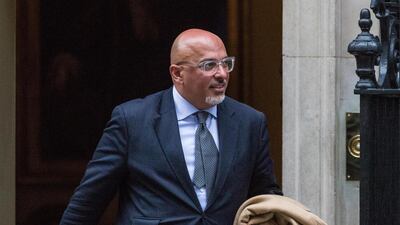G7 nations must work together to ensure public confidence in vaccines and prevent misinformation from derailing public health efforts, the UK's vaccine minister said on Tuesday.
Nadhim Zahawi's remarks came on the eve of the world's first Global Vaccine Confidence Summit, which the UK is hosting on Wednesday as part of its presidency of the G7.
Mr Zahawi said the plan for the summit was to “set ambitious goals that will help ensure trust in vaccines remains high”.
"In our interconnected world, misinformation unfortunately now travels many times faster than the virus, wth no respect for borders," he wrote in an article for The Independent.
“Factual inaccuracies, scepticism, lies and full-blown conspiracy theories all undermine the trust necessary to step up and take the jab.”
Mr Zahawi credited the rapid progress of the UK's vaccination campaign with building confidence in the system and leading to high vaccine uptake.
He said that using doctors, faith leaders and celebrities such as Lenny Henry had been key to give the vaccine drive a friendly face.
A YouGov poll last month put the UK at the top of a global table of willingness to get inoculated against Covid-19, with 90 per cent of those questioned saying they would.
The UAE was second on 87 per cent, while some of Britain’s European neighbours were much lower, with Germany on 71 per cent and France on 60 per cent.
Despite the UK’s overall success, uptake has been lower among ethnic minority groups in Britain.
Experts suggest that endemic racism and the legacy of past mistreatment create a lack of trust among ethnic minority groups.
Mr Zahawi said trust in vaccines was often “driven by complex cultural, social and political factors that we need to do much more to understand”.
Wednesday’s summit will hear from experts including World Health Organisation chief Tedros Adhanom Ghebreyesus and top US Covid-19 adviser Anthony Fauci.
Prof Heidi Larson, founder of a Vaccine Confidence Project at the London School of Hygiene and Tropical Medicine, is also set to take part in the summit.
She said that building confidence in vaccines should be part of the world’s efforts to prepare for a future pandemic.
“Now is the time to think about building foundational trust to support vaccine confidence for the future,” she said.
Dr Tedros is among those piling pressure on wealthy nations to share more Covid-19 vaccines with developing countries.
The heads of the WHO, International Monetary Fund, World Bank and World Trade Organisation issued a joint warning that vaccine inequality made it easier for new variants of the virus to take hold in poorer countries.
They said the shortfall was creating a “two-track” pandemic, with low-income nations receiving “less than 1 per cent of vaccines administered so far”.
“Inequitable vaccine distribution is not only leaving untold millions of people vulnerable to the virus. It is also allowing deadly variants to emerge and ricochet back across the world,” they said.


